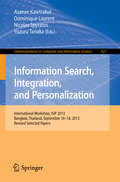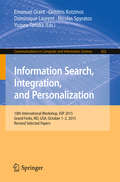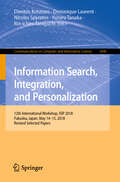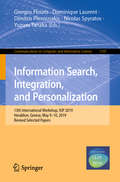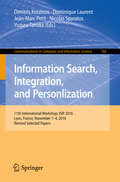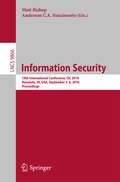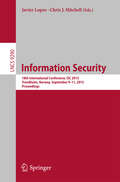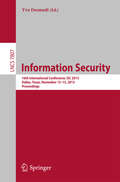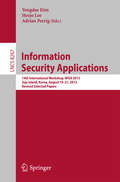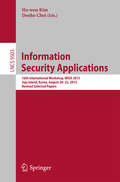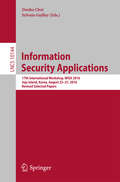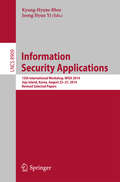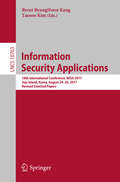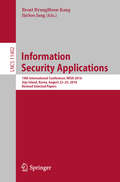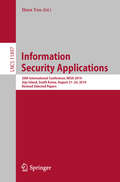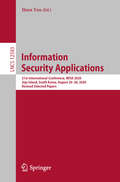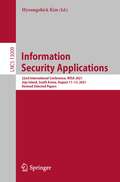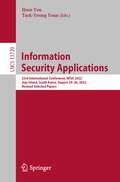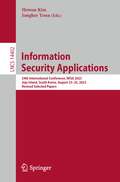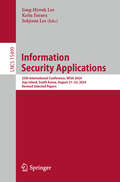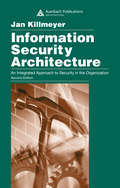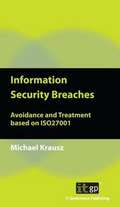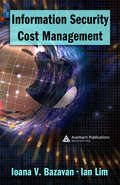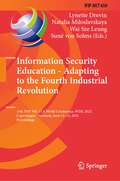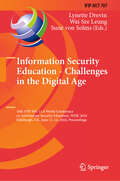- Table View
- List View
Information Search, Integration, and Personalization
by Nicolas Spyratos Yuzuru Tanaka Asanee Kawtrakul Dominique LaurentThis book constitutes the refereed post-proceedings of the International Workshop on Information Search, Integration and Personalization, ISIP 2013, held in Bangkok, Thailand, in September 2013. The 10 revised full papers presented were carefully reviewed and selected from 28 presentations. The papers are organized in topical sections on knowledge federation and integration; information discovery; recommendation systems and ontologies.
Information Search, Integration, and Personalization
by Nicolas Spyratos Yuzuru Tanaka Dominique Laurent Emanuel Grant Dimitris KotzinosThis book constitutes the refereed post-proceedings of the 7th International Workshop on Information Search, Integration and Personalization, ISIP 2012, held in Sapporo, Japan, in October 2012. The 14 revised full papers presented were carefully reviewed and selected from 29 presentations. The papers are organized in topical sections on knowledge federation and integration; social system support and visualization; social information search and discovery.
Information Search, Integration, and Personalization: 12th International Workshop, ISIP 2018, Fukuoka, Japan, May 14–15, 2018, Revised Selected Papers (Communications in Computer and Information Science #1040)
by Nicolas Spyratos Yuzuru Tanaka Dominique Laurent Dimitris Kotzinos Rin-Ichiro TaniguchiThis book constitutes the revised selected papers of the 12th International Workshop on Information Search, Integration and Personalization, ISIP 2018, held in Fukuoka, Japan, in May 2018.The volume presents 1 invited paper as well as 7 revised full papers, which were carefully reviewed and selected from 13 papers submitted to these post-conference proceedings. The papers are organized in topical sections on data integration; text and document management; advanced data mining techniques.
Information Search, Integration, and Personalization: 13th International Workshop, ISIP 2019, Heraklion, Greece, May 9–10, 2019, Revised Selected Papers (Communications in Computer and Information Science #1197)
by Nicolas Spyratos Yuzuru Tanaka Dominique Laurent Dimitris Plexousakis Giorgos FlourisThis book constitutes the revised selected papers of the 13th International Workshop on Information Search, Integration and Personalization, ISIP 2019, held in Heraklion, Greece, in May 2019.The volume presents 11 revised full papers, which were carefully reviewed and selected from 16 papers submitted to these post-conference proceedings. The papers are organized in topical sections on linked data; data analytics; data integration; data mining applications.
Information Search, Integration, and Personlization: 11th International Workshop, ISIP 2016, Lyon, France, November 1–4, 2016, Revised Selected Papers (Communications in Computer and Information Science #760)
by Nicolas Spyratos Yuzuru Tanaka Dominique Laurent Dimitris Kotzinos Jean-Marc PetitThis book constitutes the revised selected papers of the 11th International Workshop on Information Search, Integration and Personalization, ISIP 2016, held in Lyon, France, in November 2016. The 8 revised full papers presented were carefully reviewed and selected from 13 papers submitted to these post-conference proceedings from 30 conference presentations. The papers are organized in topical sections on exploratory analysis, mobility data analysis, and management of large data graphs.
Information Security
by Matt Bishop Anderson C A NascimentoInsider Threats in Cyber Security is a cutting edge text presenting IT and non-IT facets of insider threats together. This volume brings together a critical mass of well-established worldwide researchers, and provides a unique multidisciplinary overview. Monica van Huystee, Senior Policy Advisor at MCI, Ontario, Canada comments "The book will be a must read, so of course I'll need a copy. " Insider Threats in Cyber Security covers all aspects of insider threats, from motivation to mitigation. It includes how to monitor insider threats (and what to monitor for), how to mitigate insider threats, and related topics and case studies. Insider Threats in Cyber Security is intended for a professional audience composed of the military, government policy makers and banking; financing companies focusing on the Secure Cyberspace industry. This book is also suitable for advanced-level students and researchers in computer science as a secondary text or reference book.
Information Security
by Javier Lopez Chris J. MitchellThis book constitutes the refereed proceedings of the 18th International Conference on Information Security, ISC 2015, held in Trondheim, Norway, in September 2015. The 30 revised full papers presented were carefully reviewed and selected from 103 submissions. The papers cover a wide range of topics in the area of cryptography and cryptanalysis and are organized in the following topical sections: signatures; system and software security; block ciphers; protocols; network and cloud security; encryption and fundamentals; PUFs and implementation security; and key generation, biometrics and image security.
Information Security
by Yvo DesmedtThis book constitutes the thoroughly refereedpost-conference proceedings of the 16th International Conference on InformationSecurity, ISC 2013, held in Dallas, Texas, in November 2013. The 16 revised full papers presented together with 14short papers were carefully reviewed and selected from 70 submissions. Thepapers cover a wide range of topics in the area of cryptography andcryptanalysis and are organized in the following topical sections: security ofoperating systems; secret sharing; encryption; malware and Criticalinfrastructures; cryptanalysis; block ciphers and stream ciphers; entityauthentication; usability & risk perception; access control; computersecurity; privacy attacks; cryptography.
Information Security Applications
by Yongdae Kim Heejo Lee Adrian PerrigThis book constitutes the thoroughly refereed proceedings of the 14th International Workshop on Information Security Applications, WISA 2013, held on Jeju Island, Korea, in August 2013. The 15 revised full papers and 2 short papers presented were carefully reviewed and selected from 39 submissions. The papers are organized in topical sections such as cryptography, social network security, mobile security, network security, future applications and privacy.
Information Security Applications
by Ho-Won Kim Dooho ChoiThis book constitutes the thoroughly refereedpost-workshop proceedings of the 16th International Workshop on InformationSecurity Applications, WISA 2015, held on Jeju Island, Korea, in August 2015. The 35 revised full papers presented in this volume werecarefully reviewed and selected from 78 submissions. The papers are organizedin topical sections such as hardware security; cryptography, side channelattacks and countermeasures; security and threat analysis; IoT security;network security; cryptography; application security.
Information Security Applications
by Dooho Choi Sylvain GuilleyThis book constitutes the thoroughly refereed post-workshop proceedings of the 17th International Workshop on Information Security Applications, WISA 2016, held on Jeju Island, Korea, in August 2016. The 31 revised full papers including two invited talks presented in this volume were carefully reviewed and selected from 61 submissions. The papers are organized in topical sections such as network security, threat analysis, application security, cryptographic. Protocols, cryptanalysis, cryptographic implementations, authentication using bio and ML, authentication, ICT Convergent security
Information Security Applications
by Kyung-Hyune Rhee Jeong Hyun YiThis book constitutes the thoroughly refereed proceedings of the 15th International Workshop on Information Security Applications, WISA 2014, held on Jeju Island, Korea, in August 2014. The 30 revised full papers presented in this volume were carefully reviewed and selected from 69 submissions. The papers are organized in topical sections such as malware detection; mobile security; vulnerability analysis; applied cryptography; network security; cryptography; hardware security; and critical infrastructure security and policy.
Information Security Applications: 18th International Conference, WISA 2017, Jeju Island, Korea, August 24-26, 2017, Revised Selected Papers (Lecture Notes in Computer Science #10763)
by Brent ByungHoon Kang Taesoo KimThis book constitutes the thoroughly refereed post-conference proceedings of the 18th International Conference on Information Security Applications, WISA 2017, held on Jeju Island, Korea, in August 2017.The 12 revised full papers and 15 short papers presented in this volume were carefully reviewed and selected from 53 submissions. The papers are organized in topical sections such as attack and defense; theory in security; web security and emerging technologies; systems security and authentication; crypto protocols; and attack detections and legal aspects.
Information Security Applications: 19th International Conference, Wisa 2018, Jeju Island, Korea, August 23-24, 2018, Revised Selected Papers (Lecture Notes in Computer Science #11402)
by Brent ByungHoon Kang JinSoo JangThis book constitutes the thoroughly refereed post-conference proceedings of the 19th International Conference on Information Security Applications, WISA 2018, held on Jeju Island, Korea, in August 2018. The 11 revised full papers and 11 short papers presented in this volume were carefully reviewed and selected from 44 submissions. #The primary focus of WISA 2018 was on systems and network security including all other technical and practical aspects of security applications and also on the embedded, unmanned or autonomous systems and cyber physical systems in general.
Information Security Applications: 20th International Conference, WISA 2019, Jeju Island, South Korea, August 21–24, 2019, Revised Selected Papers (Lecture Notes in Computer Science #11897)
by Ilsun YouThis book constitutes the thoroughly refereed post-conference proceedings of the 20th International Conference on Information Security Applications, WISA 2019, held on Jeju Island, South Korea, in August 2019. The 29 revised full papers presented in this volume were carefully reviewed and selected from 63 submissions. The primary focus of WISA 2019 was on systems and network security including all other technical and practical aspects of security application in general. The papers are grouped in the following topical sections: Application and Game Security; Network Security and Blockchain; Cryptography; Security with AI and Machine Learning; IoT Security; Hardware Security; and Selected Security Issues.
Information Security Applications: 21st International Conference, WISA 2020, Jeju Island, South Korea, August 26–28, 2020, Revised Selected Papers (Lecture Notes in Computer Science #12583)
by Ilsun YouThis book constitutes the thoroughly refereed proceedings of the 21st International Conference on Information Security Applications, WISA 2020, held in Jeju Island, South Korea, in August 2020. The 30 full research papers included in this book were carefully reviewed and selected from 89 submissions. They are organized in the following topical sections: AI Security and Intrusion Detection; Steganography and Malware; Application, System, and Hardware Security; Cryptography; Advances in Network Security and Attack Defense; and Cyber Security.
Information Security Applications: 22nd International Conference, WISA 2021, Jeju Island, South Korea, August 11–13, 2021, Revised Selected Papers (Lecture Notes in Computer Science #13009)
by Hyoungshick KimThis book constitutes the revised selected papers from the 22nd International Conference on Information Security Applications, WISA 2021, which took place on Jeju Island, South Korea, during August 2021. The 23 papers included in this book were carefully reviewed and selected from 66 submissions. They were organized in topical sections as follows: machine learning security; cryptography; hardware security; and application security.
Information Security Applications: 23rd International Conference, WISA 2022, Jeju Island, South Korea, August 24–26, 2022, Revised Selected Papers (Lecture Notes in Computer Science #13720)
by Ilsun You Taek-Young YounThis book constitutes the revised selected papers from the 23rd International Conference on Information Security Applications, WISA 2022, which took place on Jeju Island, South Korea, during August 2022.The 25 papers included in this book were carefully reviewed and selected from 76 submissions. They were organized in topical sections as follows: network security; cryptography; vulnerability analysis; privacy enhancing technique; security management; security engineering.
Information Security Applications: 24th International Conference, WISA 2023, Jeju Island, South Korea, August 23–25, 2023, Revised Selected Papers (Lecture Notes in Computer Science #14402)
by Howon Kim Jonghee YounThis book constitutes the revised selected papers from the 24th International Conference on Information Security Applications, WISA 2023, held in Jeju Island, South Korea, during August 23–25, 2023.The 25 papers included in this book were carefully reviewed and selected from 76 submissions. They were organized in topical sections as follows: Cryptography; network and application security; privacy and management; attacks and defenses; post-quantum cryptography and quantum cryptanalysis.
Information Security Applications: 25th International Conference, WISA 2024, Jeju Island, South Korea, August 21–23, 2024, Revised Selected Papers (Lecture Notes in Computer Science #15499)
by Jong-Hyouk Lee Keita Emura Sokjoon LeeThis book constitutes the refereed proceedings of the 25th International Conference on Information Security Applications, WISA 2024, held in Jeju Island, South Korea, during August 21–23, 2024. The 28 full papers included in this book were carefully reviewed and selected from 87 submissions. They were organized in topical sections as follows: Cryptography; Network Security; AI Security 1; Network & Application Security; AI Security 2; CPS Security; Fuzzing; Malware; Software Security; and Emerging Topic.
Information Security Architecture: An Integrated Approach to Security in the Organization, Second Edition
by Jan KillmeyerInformation Security Architecture, Second Edition incorporates the knowledge developed during the past decade that has pushed the information security life cycle from infancy to a more mature, understandable, and manageable state. It simplifies security by providing clear and organized methods and by guiding you to the most effective resources avai
Information Security Breaches: Avoidance and Treatment Based on ISO27001
by Michael KrauszWiden the horizon of your Information Security Knowledge!Although breaches of information security are not a new phenomenon, the methods used to perpetrate such breaches have changed considerably over the years. Leaking information to non-authorised people has always been an issue but, in the computer age, the speed and effectiveness with which breaches of information security can occur, and the amount of harm potentially caused are disturbing. Typically, also, they favour the perpetrator, not the victim. The process outlinedThis pocket guide outlines a process and its elements for the treatment of severe breaches, and places them in the context of the associated ISO27001 controls. It provides input for decision making and breach classification, and case studies where the reader can check out how other companies were affected and what they did, or did not do, upon becoming the victim of a breach. Intended to serve two purposes. . . Firstly, this title provides a general discussion of what information security breaches are, how they can be treated, and what ISO27001 offers in that respect, illustrated with details of real-life information security incidents. It aims to serve as a facilitator to widen the horizon of the reader seeking knowledge, or as an introduction for those who arejust starting to think about information security. Secondly, it will form a first line of defence for the reader who is the victim of an incident and is looking for guidance and direction. Here, it will help the reader by identifying, discussing and evaluating treatment options and, through the case studies, it will reduce the tension of the situation readers may find themselves in once abreach occurs. The audienceThis guide is aimed at CSOs, CISOs, IT Security Managers, CIOs and, last but not least, CEOs. It particularly addresses personnel in non-IT roles, in an effort to make this unwieldy subject more comprehensible to those who, in a worst-case scenario, will be on the receiving end of requests for six- or seven-figure excess budgets to copewith severe incidents.
Information Security Cost Management
by Ian Lim Ioana V. BazavanWhile information security is an ever-present challenge for all types of organizations today, most focus on providing security without addressing the necessities of staff, time, or budget in a practical manner.Information Security Cost Management offers a pragmatic approach to implementing information security, taking budgetary and real
Information Security Education - Adapting to the Fourth Industrial Revolution: 15th IFIP WG 11.8 World Conference, WISE 2022, Copenhagen, Denmark, June 13–15, 2022, Proceedings (IFIP Advances in Information and Communication Technology #650)
by Natalia Miloslavskaya Lynette Drevin Suné Von Solms Wai Sze LeungThis book constitutes the refereed proceedings of the 15th IFIP WG 11.8 World Conference on Information Security Education, WISE 2022, held in Copenhagen, Denmark, in June 2021. The 8 papers presented were carefully reviewed and selected from 17 submissions. The papers are categorized into the following topical sub-headings: Securing the Fourth Industrial Revolution through Programming; Cybersecurity in the Fourth Industrial Revolution: Charting the Way Forward in Education; and Real-World Cybersecurity-Inspired Capacity Building.
Information Security Education - Challenges in the Digital Age: 16th IFIP WG 11.8 World Conference on Information Security Education, WISE 2024, Edinburgh, UK, June 12–14, 2024, Proceedings (IFIP Advances in Information and Communication Technology #707)
by Lynette Drevin Suné Von Solms Wai Sze LeungThis book constitutes the refereed proceedings of the 16th IFIP WG 11.8 World Conference on Information Security Education on Information Security Education Challenges in the Digital Age, WISE 2024, held in Edinburgh, UK, during June 12–14, 2024. The 13 papers presented were carefully reviewed and selected from 23 submissions. The papers are organized in the following topical sections: cybersecurity training and education; enhancing awareness; digital forensics and investigation; cybersecurity programs and career development.
